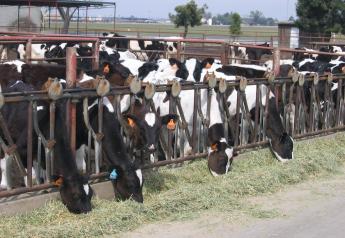Evening Report | October 15, 2021

Click here for the weekly export sales/commitments charts and here for report details.
Check our advice monitor on ProFarmer.com for updates to our marketing plan.
Your Pro Farmer newsletter is now available… Corn and soybean futures reacted negatively to USDA's October crop reports, but soybeans led a late-week rebound amid a flurry of export sales to China and "unknown destinations." Inflation remains a building topic, with U.S. consumer prices hitting a 13-year high and Chinese producer prices surging to record levels. Labor strikes in the U.S. are the latest threat to supply-chain shortages. We cover all this and much more in this week's newsletter, which you can access here.
NOPA crush falls to three-month low in September… Members of the National Oilseed Processors Association (NOPA) crushed 153.8 million bu. of soybeans in September, down 3.2% from August and 4.8% below last year. The crush pace was 1.3 million bu. lighter than expected and a three-month low. The NOPA data implies total soybean crush of 163.5 million bu. for September.
NOPA soyoil stocks at the end of September totaled 1.684 billion lbs., which was up 16 million lbs. from August and higher than expected, despite the lower-than-expected crush, implying lower use. One reason for the setback in use was plunging exports.
Correction to the Russian wheat export tax item in FTT… In “First Thing Today” we incorrectly reported the export tax on Russian wheat shipments from Oct. 20-26 would be $287.60 per MT. That was incorrect. The export tax will be $61.30 per MT, up from $58.70 per MT in the current week. The $287.60 value is the indicative price from which the tax was calculated.
IEA warns rising energy prices could slow global recovery... Rising energy prices could boost inflation and hold back the global economic recovery, the International Energy Agency (IEA) said Thursday. IEA said record coal and natural gas prices and rolling blackouts in some countries “are prompting the power sector and energy-intensive industries to turn to oil to keep the lights on and operations humming.” It noted provisional data from August “already indicates that there is some unseasonably high demand for fuel oil, crude and middle distillates for power plants across a number of countries, including China, Japan and Pakistan in Asia, Germany and France in Europe and Brazil.”
Meanwhile, rising energy prices “are also adding to inflationary pressures that, along with power outages, could lead to lower industrial activity and a slowdown in the economic recovery." IEA also predicted OPEC+ oil demand is set to outpace supply until at least the end of 2021, while drawdowns have global oil product stocks at their lowest levels in eight years.
GOP wants answers on actions to address energy prices… Republican members of the House Energy and Commerce Committee are asking Department of Energy (DOE) Secretary Jennifer Granholm to lay out the actions being considered by the Biden administration to address rising energy prices.
The lawmakers said while they understand the global supply-chain issues and the pandemic have influenced prices that have risen to seven-year highs, “we are deeply concerned that the administration’s anti-fossil fuel agenda is significantly contributing to higher bills for American families and businesses.” The rise in domestic energy prices “presents serious threats to the health, safety, and welfare of Americans and requires immediate attention.”
Specifically, they asked Granholm to respond by Oct. 21 on several issues, including what the administration is doing to increase U.S. oil production, what “legal authorities and policy justification supporting DOE’s consideration of an Strategic Petroleum Reserve (SPR) release and a crude oil export ban,” along with analysis and projections from the agency on energy prices, actions taken by the administration that could be causing or contributing to the price increases.
Bottom line: It is unlikely that any potential response from Granholm will satisfy the lawmaker queries and are largely an effort to keep the energy price issue high profile with voters.
‘The first big shock of the green era’… The global energy crisis is exposing "deeper problems as the world shifts to a cleaner energy system," the Economist writes in its cover story (link). These include "inadequate investment in renewables and some transition fossil fuels, rising geopolitical risks and flimsy safety buffers in power markets." Upshot: "Without rapid reforms there will be more energy crises and, perhaps, a popular revolt against climate policies." Meanwhile, a White House report (link) says climate change poses "systemic risks" to the U.S. financial system as part of its “green” initiative.
DOE announces investment in offshore wind wildlife and environmental data projects... DOE is investing $13.5 million in four environmental and wildlife data monitoring projects aimed at supporting offshore wind development. DOE said the projects are being funded jointly with the Department of Interior’s (DOI) Bureau of Ocean Energy Management (BOEM) and “will inform offshore wind siting, permitting and help protect wildlife and fisheries as offshore wind deployment increases,” and support the Biden administration’s goal to develop 30 gigawatts (GW) of offshore wind by 2030. Two projects will support wildlife and fisheries monitoring efforts on the East Coast with two focused on preparing the West Coast for floating offshore wind development by collecting wildlife distribution data and developing tools to monitor the environmental effects of floating offshore wind energy.
Sinema rules out vote on reconciliation package before infrastructure bill... Sen. Kyrsten Sinema (D-Ariz.) told fellow Democrats in the House of Representatives this week she will not vote for a multitrillion-dollar package that is a top priority for President Joe Biden before Congress approves a $1 trillion infrastructure bill, according to a Reuters report citing “a source briefed on a meeting.” In a previously unreported online meeting with a group of at least nine moderate House Democrats on Wednesday, Sinema and fellow moderate Democratic Senator Joe Manchin (D-W.Va.) said they would not abide by any deadlines adopted by leadership to force votes on the package. According to Reuters, the group “suggested putting a November deadline for passing the multi-trillion dollar and moving on with the bipartisan infrastructure bill, but Manchin and Sinema rejected that idea, arguing artificial deadlines are a bad idea.”
Bitcoin futures ETF to begin trading next week… The Securities and Exchange Commission is set to allow the first U.S. Bitcoin futures exchange-traded fund (ETF) to begin trading next week, Bloomberg reports. The proposals by ProShares and Invesco are based on futures contracts, differentiating them from those previously rejected. Meanwhile, Russian President Vladimir Putin said he accepted crypto’s role in making payments.
Former FDA chief may be tapped to lead agency again... President Joe Biden may name former Food and Drug Administration (FDA) Commissioner Robert Califf to again lead the agency, according to several media outlets. Califf led FDA late in the Obama administration after winning Senate confirmation on a vote of 89-4. Interestingly, several groups issued statements about the potential nomination — both in support and opposition to the potential choice. Califf would be viewed as a “safe” nominee, but it is not clear whether progressive lawmakers would also back the choice as they have called for more diversity among appointees in the Biden administration. Acting Commissioner Dr. Janet Woodcock, formerly a top candidate, was criticized over FDA’s approval of an Alzheimer’s drug in June.
Cotton AWP over 90 cents for second week... The Adjusted World Price (AWP) moved up to 92.88 cents per pound effective today (Oct. 15), the second straight week above 90.00 cents per pound. It remains the highest AWP since the week of Sept. 23, 2011, when it was 86.71 cents per pound, which ended a string of 44 straight weeks above the 90.00-cent mark. Meanwhile, USDA said Special Import Quota #26 would be established Oct. 21 for the import of 49,482 bales of Upland cotton, applying to supplies purchased no later than Jan. 18 and entered into the U.S. no later than April 18.






